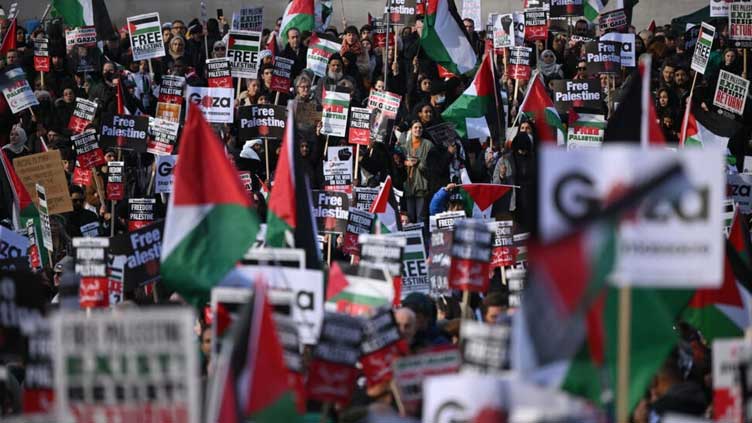UK police out in force for 'tense' pro-Palestinian march

World
Pro-Palestinian marches have been held in the UK capital over recent weekends
London (AFP) – Almost 2,000 police officers will be on duty Saturday when more than 100,000 pro-Palestinian supporters are expected to march through London, with extra powers in place to protect landmarks honouring Britain's war dead.
Pro-Palestinian marches have been held in the UK capital over recent weekends, with police making almost 100 arrests for offences including supporting banned organisations and serious hate crimes.
But Saturday's march promises to be more fraught as it coincides with Armistice Day, which commemorates those who have died in conflict since World War I. Prime Minister Rishi Sunak made a late plea for peaceful demonstrations
"It is because of those who fought for this country and for the freedom we cherish that those who wish to protest can do so, but they must do so respectfully and peacefully," Sunak said in a statement released late Friday.
It will be a "particularly challenging and tense weekend", Laurence Taylor, the Metropolitan Police deputy assistant commissioner leading Saturday's operation, told a media briefing on Friday.
He estimated that more than 100,000 people would be at the march, with organisers changing the route to ensure it will not pass any landmark memorials. However, police said that previous events had seen "small groups break away" and that "their behaviour has been escalating and becoming more violent".
As a result, metal barriers will be placed around the area containing the most significant memorials, with police able to arrest any marchers attempting to gather there.
The Cenotaph memorial -- the focal point of commemorations -- will have a constant police presence until the conclusion of remembrance events on Sunday, said Scotland Yard.
Right-wing counter-protesters, which Taylor said were likely to include groups of football hooligans, are also set to descend on London for the weekend, increasing the risk of flashpoints.
Political row
"There will be times when you see pockets of confrontation," said Taylor, adding it was "likely" that police would need to use force at some point. "It will be a difficult weekend," he warned.
The operation is "far greater and more complex than we've delivered before," for Remembrance weekend, the force said earlier. "The scale of the policing operation in place represents a doubling of the number of officers on duty for the weekend's events," they added. Around 1,850 will be on duty on Saturday, and 1,375 on Sunday.
The march has caused a rift between the police and government, with calls from ministers to ban the event sparking concern over political interference in operational matters.
The row escalated when Interior Minister Suella Braverman, who is responsible for policing, accused the Met of treating protesters for left-wing causes more softly than others, leading to widespread calls for her to be sacked.
Sunak, meanwhile, said he would hold Met chief Mark Rowley "accountable" for his decision to allow the demonstration against the Israel-Hamas war to go ahead. The Conservative leader has called the march "provocative and disrespectful" but organisers resisted his pleas to postpone it.
The rally, organised by the Stop the War Coalition, does not meet the threshold for requesting a government order to stop it going ahead, Rowley has said. Rowley said such a ban was "incredibly rare" and a "last resort" where there is a serious threat of disorder.
"The events taking place this weekend are of great significance and importance to our nation," he said in a statement. "We will do everything in our power to ensure they pass without disruption." November 11 commemorates the end of fighting in World War I, and armed forces casualties in conflicts since 1914.


